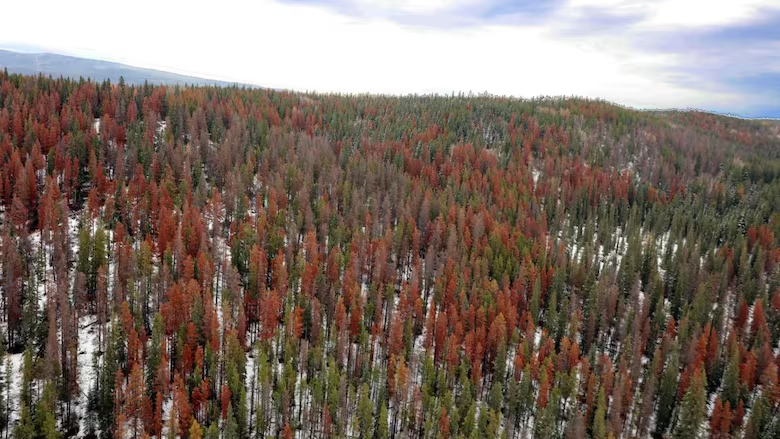Federal cash for mountain pine beetle battle will help stretch Alberta's efforts, researcher says
Cold winter hurt beetle population but costly eradication efforts can't let up

The Alberta government is making some headway in its fight against the mountain pine beetle and an influx of new cash announced Thursday will help it continue with eradication efforts this winter.
However, the $68.4 million over three years from the federal government — of which $24 million will be available in 2020-21 — will only go so far, since the province can easily spend $50 million on pine beetle control in a single year, says one of Alberta's top pine beetle researchers.
"This funding definitely helps," Janice Cooke, a biological sciences professor at the University of Alberta, told CBC Radio's Edmonton AM on Friday.
"Twenty-four million dollars sounds like a ton of money but these kinds of spread control efforts are super labour intensive," she said. "They are challenging, so $24 million can be spent pretty quickly."
The Alberta government conducts aerial surveys each fall looking for the telltale red, dry and dead trees on which pine beetles have feasted.
This year, the government says its surveys found that 147,000 trees were killed by mountain pine beetles, in an area spanning almost eight million hectares.
- Alberta's destructive mountain pine beetle likely decimated by cold snap
- Tracking the mountain pine beetle threat with a drone and a butterfly net
This is good news. The number is down from the 244,000 dead trees that were detected last year.
A cold winter in 2019-20 helped kill some of the pests, said Cooke. Pine beetle larvae can survive very cold temperatures but sustained temperatures of -30 Celsius and colder in the Jasper and Hinton areas last January and February probably killed off about 90 per cent of larvae.

But the cold can't kill all larvae, and that's where the federal cash will buoy the costly eradication efforts of the Alberta government.
The process involves sending teams to trees that have been recently attacked. The trees are cut down and burned on-site.
"It takes a lot of helicopter time and plane time, that's really expensive," said Cooke.
All of this has to happen during winter months when the larvae are snuggled down under the tree sap in a form of insect hibernation.
Since pine beetles spend most of their life under the tree bark, other cheaper methods of control do not work.
"They are not exposed enough to do chemical sprays, which can be used against other insect pests," said Cooke.
However, doing nothing isn't an option.
The beetles could devastate the provincial forestry industry, which employs 18,700 people directly and another 25,300 people in supporting occupations, according to the Alberta government.
Alberta is seen as a gateway province, too. Cooke said stopping pine beetles here is important to preserve jack pine forests in provinces to the east.
"Mountain pine beetle isn't just a regional problem," Cooke said. "It's not just a problem of Hinton, it's not just a problem of Alberta. It's a federal problem. It's a problem that has the potential to impact all Canadians."